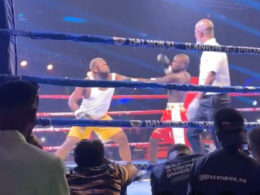A Federal High Court in Lagos has dismissed a N500 million copyright infringement lawsuit brought by Jude Nnam, a Catholic composer, against Nigerian music stars Kcee (Kingsley Okonkwo) and his brother, E-Money (Emeka Okonkwo).
In 2021, Nigerian composer Jude Nnam filed a copyright infringement lawsuit against popular musician Kcee and his brother E-Money, seeking damages of N150 million. The lawsuit centered around Kcee’s album Cultural Praise Vol. 1, which allegedly included three of Nnam’s compositions: “Som Too Chukwu,” “Otito Diri Chineke,” and “K’ Anyi Jee N’ Ulo Chukwu.” Nnam claimed that Kcee used these songs without his consent or proper acknowledgment.
Nnam, known for his contributions to Catholic music and renowned for directing the Papal Choir during Saint Pope John Paul II’s visit to Nigeria in 1998, argued that his 2001 composition, “Som Too Chukwu,” was adapted and reproduced in Cultural Praise Vol. 1. According to Nnam, the first stanza and chorus of his song were used in Kcee’s rendition, with the original version running for five minutes and the infringing version using the first minute and forty-seven seconds.
The composer maintained that the songs were meant for private worship and liturgical purposes, not commercial gain, further asserting that Kcee’s use of them violated his copyright. Nnam’s legal team had written to Kcee in early 2021, but they claimed their concerns were ignored, prompting the lawsuit. Nnam sought an injunction to prevent further distribution of the songs, along with damages and royalties from sales.
Kcee and E-Money, however, denied the allegations and described the lawsuit as frivolous, suggesting it was an attempt to extort money. They argued that the songs were traditional praise songs commonly sung in Nigerian churches and should not be subject to copyright.
After prolonged legal battles, the court dismissed the case in 2024, ruling that Nnam failed to provide sufficient evidence to support his claims of copyright infringement. The presiding judge, Kehinde Ogundare, ruled in favor of Kcee and E-Money, also ordering Nnam to pay a punitive cost of N1 million.
This dismissal brought an end to the three-year legal dispute, although it reignited discussions around intellectual property rights and the boundaries of traditional music adaptations in Nigeria’s entertainment industry.










Join our Channel...